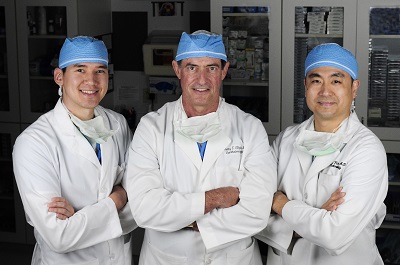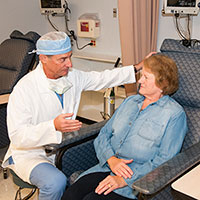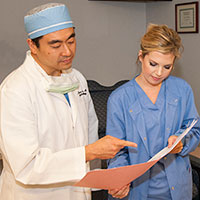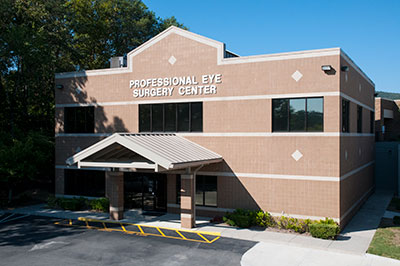
Cataract Surgery | Blepharoplasty | Corneal Transplant | Glaucoma Surgery: Trabeculectomy | Glaucoma Surgery: Ahmed Tube Shunt | Age-Related Macular Degeneration, Diabetic Retinopathy, and Vascular Occlusions: Intravitreal Avastin Injections | Punctal Plugs | Eye Floaters
 Cataract Surgery
Cataract Surgery
Click on the link below to watch a video testimonial from one of our patients: https://www.youtube.com/watch?v=M3FskMudB7c
Who needs cataract surgery? If you are in your 50s, you may have the beginnings of a cataract. Over half of the adults over age 60 have cataracts that affect their vision. A cataract occurs when the natural lens in the eye becomes cloudy. Everyone develops cataracts over time. So don’t be alarmed if you are told you have them. Symptoms of cataracts include reduced depth perception, annoying glare of sunlight, diminished color perception, and poor night vision including night driving. The good news is that cataracts can be cured with a straight-forward cataract surgery.
Our eye surgeons have extensive training and experience with cataract surgery and implant technology. We continuously strive to provide our patients with the safest, most pain-free recovery of vision possible. New advances and techniques have made cataract surgery one of the most successful of life-improving surgical procedures performed. And our eye
surgeons are rated  among the top ophthalmologists in the country. We offer the full array of intraocular lens options ranging from standard, toric (astigmatism-correcting), to multifocal lens implants (good vision far away and near for reading without the need for glasses). All of our cataract surgeries are performed on an outpatient basis using the latest techniques and technologies. Cataract surgery is a no-stitch, no-shot, no-patch, no-pain surgery.
among the top ophthalmologists in the country. We offer the full array of intraocular lens options ranging from standard, toric (astigmatism-correcting), to multifocal lens implants (good vision far away and near for reading without the need for glasses). All of our cataract surgeries are performed on an outpatient basis using the latest techniques and technologies. Cataract surgery is a no-stitch, no-shot, no-patch, no-pain surgery.
Professional Eye Associates Surgery Center
Please click on the link below to watch a video testimonial regarding our Surgery Center from one of our patients:
https://www.youtube.com/watch?v=0H7pfUIbug0
We are proud to share that northwest Georgia’s only state-of-the-art, AAAHC certified, All-Eye, Same-Day Surgery Center is located at our Dalton office. This means that all the staff and nurses caring for you from start to finish are uniquely skilled and focused on caring for eye surgery patients.
This specialized care translates to a smooth, more efficient and comfortable surgical experience for you.
For more on this procedure, visit our Cataracts page.

Blepharoplasty (Eyelid Lift Surgery)
Please click on the link below to watch a testimonial video from one of our patients:
https://www.youtube.com/watch?v=9gW-A4hXqGk
Blepharoplasty is a cosmetic and functional surgical procedure of the eyelids that can significantly improve the appearance of the upper or lower eyelid. Incisions are made either above the upper eyelid, below the lower eyelid or both, to allow for the surgeon to redistribute or remove fat deposits and remove excess skin layers which leads to a more natural and youthful eyelid appearance. These incisions are made in such a way as to be concealed by the natural creases of the eyelids, and as a result, the incisions are barely noticeable or not noticeable at all. The results of the procedure are immediately noticeable, and recovery after the procedure rarely involves more than some slight swelling and bruising, dry eyes and minor discomfort. And whether it's to help rejuvenate the appearance of your eyelids or to improve your visual function, the eye surgeons at Professional Eye Associates are highly qualified and skilled at performing blepharoplasty. We would be happy to assist you with your eye care needs. We perform blepharoplasty surgery at our state-of-the-art, AAAHC certified, All-Eye-Same Day-Surgery Center.
Corneal Transplantation
Please click on the link below to watch a testimonial video from one of our patients:
https://www.youtube.com/watch?v=JNME7Ns70v4
The cornea is the clear dome on the front of the eye. It is usually clear and shaped in a smooth and symmetrical manner to provide clear vision. There are a variety of conditions which can affect the health of the corneas. It can cloud or develop scar tissue, there can be warpage or thinning of the cornea, or the cornea can swell abnormally. All these conditions cause poor vision which cannot be improved with glasses or contacts.
But there is a treatment. The corneas can be transplanted with healthy human donor tissue to restore the sight of patients suffering from corneal disease. The older surgical technique called Penetrating Keratoplasty (PKP) removed the entire cornea, like a cookie cutter cutting a cookie. Although the surgery is successful, it requires many stitches in the eye to hold the new cornea in place. As a result, it requires a very long time (12-18 months) to heal and recover the vision.
And although PKP still has its place, most corneal transplant surgeons prefer the newer techniques that only remove the diseased part of the cornea. These include Descemet's Stripping Automated Endothelial Keratoplasty (DSAEK) and Deep Anterior Lamellar Keratoplasty (DALK). DSAEK selectively removes the diseased part of the cornea on the back surface of the eye. Conditions include Fuchs Endothelial Dystrophy and Pseudophakic Bullous Keratopathy. DALK removes the front surface corneal tissue. This is useful for conditions such as scar tissue on the front of the eye or keratoconus which is the abnormal thinning of the cornea. Both of these newer procedures are safer surgeries and results in faster visual recovery and protects the patient by only removing the disease part of the cornea. These are delicate surgeries and are performed by a corneal specialist. Professional Eye Associates is proud to inform you that Dr. Kim is the area's only fellowship-trained corneal specialist in the Northwest Georgia region. We perform DSAEK surgery at our state-of-the-art, AAAHC certified, All-Eye-Same Day-Surgery Center. PKP and DALK require general anesthesia.
For more on these procedures, visit our Corneal Transplantation FAQ page.
Glaucoma Surgery (Trabeculectomy)
If you are suffering from glaucoma, glaucoma eye drops are first line treatment. Sometimes Selective Laser Trabeculoplasty (SLT) is an option to help facilitate drainage of fluid out of the eye to relieve intraocular pressure. This procedure is generally used for patients with open angle glaucoma with progressively worsening eye pressure despite eye drop treatments. SLT has a modest effect on pressure and may require repeated treatments over time to help control the pressure since the effects of the laser can diminish over time.
If these measures fail, a trabeculectomy may need to be performed. Trabeculectomy is a surgical procedure in which the eye surgeon creates a small window in the sclera (white part of the eye). Your eye surgeon will then cover it with the conjunctiva (the natural translucent layer that covers the sclera). Trabeculectomy requires a big commitment on the part of the patient and surgeon with frequent after-surgery follow-up visits to ensure that the surgery is a success. We perform trabeculectomy surgery at our state-of-the-art, AAAHC certified, All-Eye-Same Day-Surgery Center.
Patients may experience mild discomfort during the procedure and some blurry vision following. The blurriness should subside within a couple of days but may take as long as a few weeks in some cases. Follow up appointments will be scheduled to monitor the results of the treatment.
Glaucoma Surgery – Ahmed Glaucoma Valve (AGV)
Your eye surgeon may inform you that a glaucoma tube shunt is right for you. We use the Ahmed valved tube shunt at Professional Eye Associates. The valve helps prevent the eye pressure from going too low. The implant device is placed on top of the sclera (the white part of the eye) and a thin tube is inserted into the eye which acts as the drainage conduit. The fluid drains out of the eye and into the device where there is a reservoir that receives the fluid. We perform tube shunt surgery at our state-of-the-art, AAAHC certified, All-Eye-Same Day-Surgery Center.
Age-Related Macular Degeneration, Diabetic Retinopathy, Retinal Vascular Occlusions and Intravitreal Anti-VEGF (Avastin, Lucentis and Eylea)
The macula is the part of the blood vessel layer called the retina responsible for the most important part of your vision, central vision. There are several conditions which can affect the macular. Macular degeneration (AMD) is an age-related condition that leads to vision loss, usually both eyes, in the center of the field of vision. Macular degeneration is one of the leading causes of vision loss in Americans 65 and older.
As cells in the macula die, vision decreases. Generally, Age-related macular degeneration (AMD) is a progressively worsening condition that causes permanent, central vision loss. There are two forms, dry and wet. The dry type causes slowly deteriorating central vision and is the more common and milder of the two forms. Unfortunately, there is very little we can do for dry AMD except to recommend taking specialized eye vitamins (AREDS 2 formula) and omega-3s such as fish oil 1000 mg twice daily. In contrast, the wet form is less common but can cause profound vision loss. Sudden vision loss in the center of the vision results from a sudden bleed in the choroidal vessels deep to the retinal layers. Intravitreal injections such as Avastin are helpful to reduce bleeding and help restore vision in some cases of wet AMD.
Macular degeneration leads to permanent vision loss. Treatment is focused on early detection, maintenance treatments, and long-term follow-up visits to ensure the disease does not progressively get worse.
Intravitreal Anti-VEGF Therapy (Avastin, Lucentis and Eylea)
Please click on the link below to watch one of our doctors explain age-related macular degeneration:
https://www.youtube.com/watch?v=R0KC_D9fL7k
Intravitreal Anti-VEGF (Vascular Endothelial Growth Factor) is used to treat "wet" macular degeneration. The two main medications used are Avastin and Lucentis. New medications are actively being researched and undergoing clinical studies. The abnormal bleeding in the choroidal vessels cause tissue swelling. Avastin and Lucentis are anti-VEGF (Vascular Endothelial Growth Factor) medications which are antibodies that stabilize the abnormal blood vessels in the choroid and retina by reducing bleeding and tissue swelling. When the blood and fluid is absorbed, in some cases, the vision is improved. Intravitreal Avastin, Lucentis, and Eylea are injected into the eye using a small gauge needle. Patients experience minimal to no discomfort during the procedure. It is important to understand that sometimes the injections do not seem to improve the vision. This is because there may have been permanent damage to the macular tissue. In these cases, treatment is more focused on preservation of vision rather than restoration of vision.
Punctal Plugs
Did you know that your tears are not just to help you cry? Microscopic amounts of tears are produced by your tear glands every time you blink your eyes, even if you can't feel or see it. These tears lubricate the eyes and function to maintain eye comfort and enhance vision. Tears are multifunctional. They contain mucous which can trap debris and particulate matter. They also contain antibodies to help your eye fight infectious organisms. There is also a fat layer which helps prevent evaporation and fight dryness. Therefore, when tear production is insufficient, it can create many different problems for the eyes. Not only are dry eyes uncomfortable, they cause blurry vision and increase the risk for injury and infection.
For incidental cases of dry eyes, over-the-counter eye lubricants are all that are required to ease the discomfort. Be sure to use an artificial tear product and avoid products that say "get the red out" as these contain unneeded chemicals that may worsen dry eyes. When the body cannot or does not produce enough tears, or when the tears are drained or evaporating too quickly on a regular basis, then this may be a condition known as dry eye syndrome. Dry Eye Syndrome is a chronic condition that is managed but not cured.
In addition to lubricant eye drops, lubricant gels at bedtime, and prescription products like Restasis are helpful. A very effective device called a lacrimal plug, also called a punctal plug, can be placed by your doctor. These are inserted into the tear ducts (drains) to stop tears from flowing out of the eye too quickly. There are two types, permanent and temporary plugs. Temporary plugs dissolve 90 days after placement while permanent plugs stay in the tear duct indefinitely unless they fall out or are removed by your doctor. Thus, permanent plugs are reversible, but long lasting. For severe dry eye cases, the tear ducts may need more aggressive treatment and can be closed surgically.
Eye Floaters
What are eye floaters? Virtually every individual has experienced or will experience the visual shadows caused by vitreous strands and opacities, commonly referred to as 'floaters', during their lifetime. For most this event is a minor and short-lived inconvenience, but for some it can become a disabling condition. If you suffer from eye floaters, then you are already familiar with the frustrating visual disturbance caused by these cobweb and cloud-like shadows.
Are There Treatments Available?
Yes! Laser Floater Treatment, LFT, is a minimally invasive, in-office procedure that can provide much-needed relief from eye floaters. It can also delay or obviate the need for invasive surgery. Professional Eye Associates is the only eye center in the area that offers this laser treatment and Dr. Kim is the only certified laser specialist in all of NW Georgia and the Chattanooga area.
Check out this patient testimony:
How Does Laser Floater Treatment Work?
During the procedure, nanosecond pulses of laser light convert the collagen and hyaluronin molecules within the floater into a gas, removing the floater and/or reducing it to a size that no longer impedes vision.